When it comes to competitive analysis, digital marketing, and SEO, Similarweb and Semrush are two of the most widely used platforms. Both provide valuable insights into website traffic, SEO, and online visibility, but they serve slightly different purposes.
Similarweb gives you data on every aspect of your marketing, from high-level market analysis and competitor benchmarking to a complete SEO suite that covers all areas of your search strategy.
Semrush, on the other hand, at its core, is an SEO and digital marketing suite that features website traffic insights.
In this post, we’ll break down their data accuracy, SEO features, and traffic analysis to help you decide which tool best fits your needs.
But first, let’s get to know both platforms:
Getting to know the platforms
What is Similarweb?
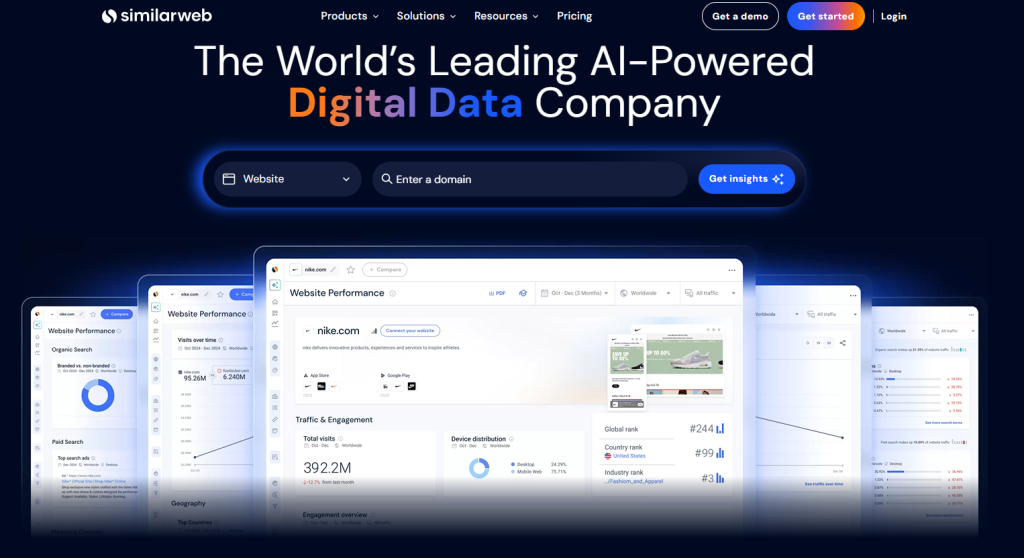
Similarweb is a digital intelligence platform that provides businesses with deep insights into website traffic, online behavior, and market trends. It’s designed to help marketers, analysts, and decision-makers understand how users interact with websites, where traffic is coming from, and how competitors are performing across the web. By aggregating data from a wide range of sources, Similarweb paints a comprehensive picture of the digital landscape, making it a go-to solution for competitive benchmarking and strategic planning.
Similarweb helps users analyze the performance of their own websites and benchmark them against competitors in real-time. It offers visibility into traffic sources, including direct, referral, organic search, paid search, social, and display ads, so businesses can identify which channels drive growth. The platform also provides a complete set of SEO tools, enabling users to optimize every aspect of their SEO and digital marketing efforts. Whether you’re exploring a new market, researching a competitor, or optimizing your traffic acquisition strategy, Similarweb delivers actionable data to support smarter decisions.
What is Semrush?

Semrush is a comprehensive digital marketing platform built to help businesses improve their online visibility and gain a competitive edge across search engines and paid channels. It’s widely used by SEO professionals, content marketers, advertisers, and agencies to manage and grow their digital presence. Whether you’re looking to boost organic traffic, run more effective PPC campaigns, or uncover what’s working for your competitors, Semrush provides the data and tools to make it happen.
At its core, Semrush offers insights into how websites perform in search engines and how competitors acquire traffic. It enables users to track keyword rankings, analyze backlinks, audit their websites for technical issues, and develop optimized content strategies. Additionally, Semrush provides tools for planning and managing paid advertising campaigns and monitoring social media activity. This makes it a versatile platform that supports both SEO and broader digital marketing efforts.
Which keyword research tool is for you?
Similarweb:
Similarweb’s keyword research tool offers a powerful set of tools designed to help businesses uncover search opportunities across platforms like Google, Amazon, and YouTube. What sets Similarweb apart is its inclusion of unique keyword metrics, such as search intent, zero-click rates, and SERP feature visibility, which help marketers understand not just what people are searching for but how they interact with search results. Users can also analyze competitors’ keyword strategies and discover high-potential keywords, making it an essential tool for building data-driven SEO and PPC campaigns.
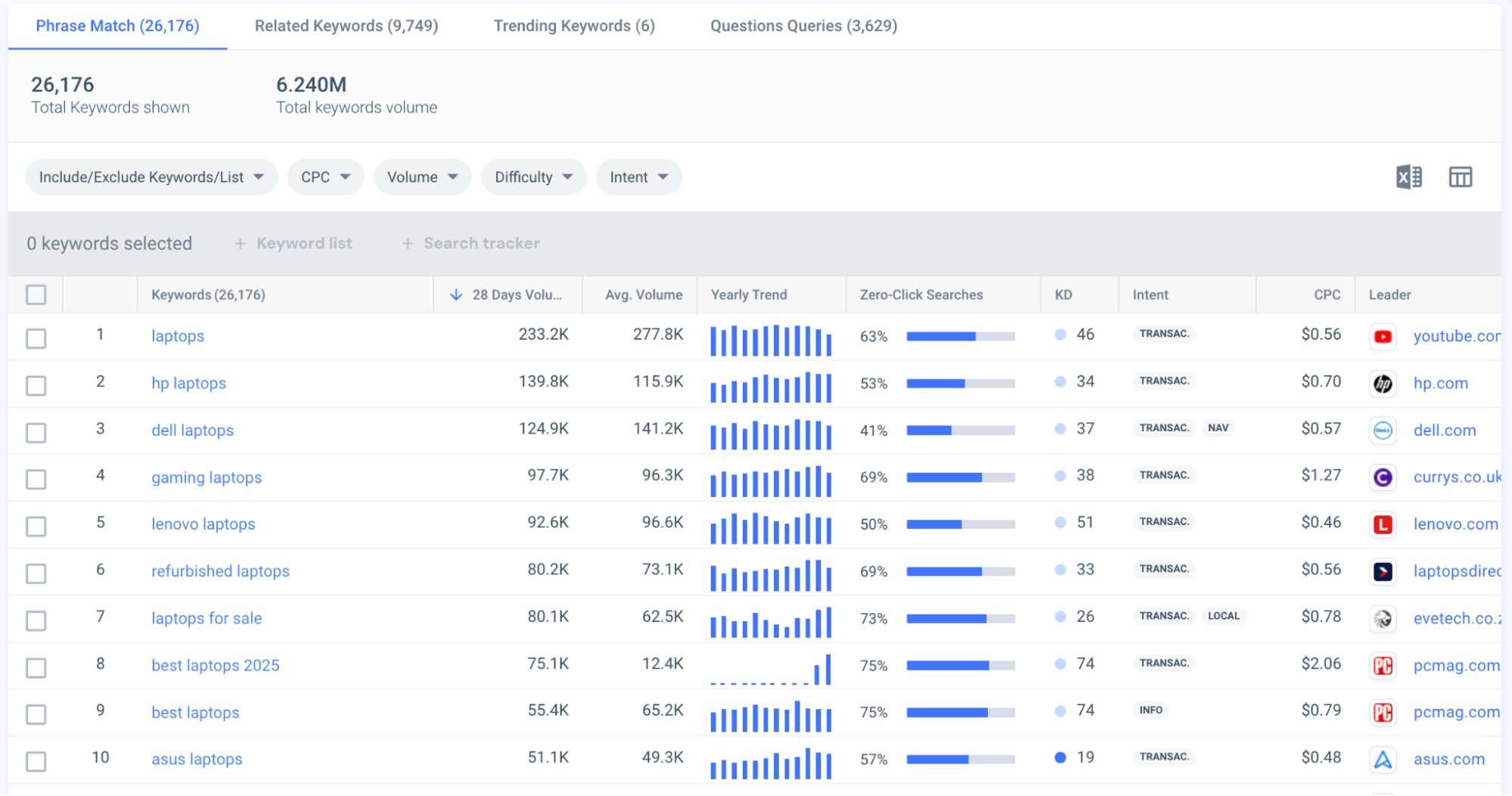
- Fresh and accurate data: Similarweb updates its keyword data daily, allowing access to insights from the last 28 days. This ensures that businesses can analyze recent trends and make data-driven decisions based on real-time search behavior.
- Multi-platform keyword analysis: Get keyword research across Google, Amazon, and YouTube, and understand search demand and user intent across different platforms.
- Unique keyword metrics: Unlike many other tools, Similarweb offers SERP features, zero-click search data, and search intent classification within its keyword research tools. This helps users understand not just which keywords drive traffic, but also how users interact with search results, including which keywords trigger featured snippets, local packs, or video results.
- Competitor strategy analysis: The platform enables you to analyze your competitors’ keyword strategies with ease. You can see all of the metrics above and quickly see what queries are working for them so that you can compete and grow your search market share.
Semrush:
Semrush offers a robust keyword research suite built to help marketers find, evaluate, and organize high-performing keywords for both SEO and PPC strategies. At the center of it is the Keyword Magic Tool, which generates thousands of keyword variations along with detailed metrics like search volume, keyword difficulty, CPC, and search intent. Semrush also categorizes keywords by intent, such as informational or transactional, allowing users to align content with user needs. Additionally, the Keyword Gap tool reveals opportunities by comparing your site’s keyword profile with competitors. Together, these features offer a comprehensive system for targeting the right keywords, building topical clusters, and staying ahead in search visibility.
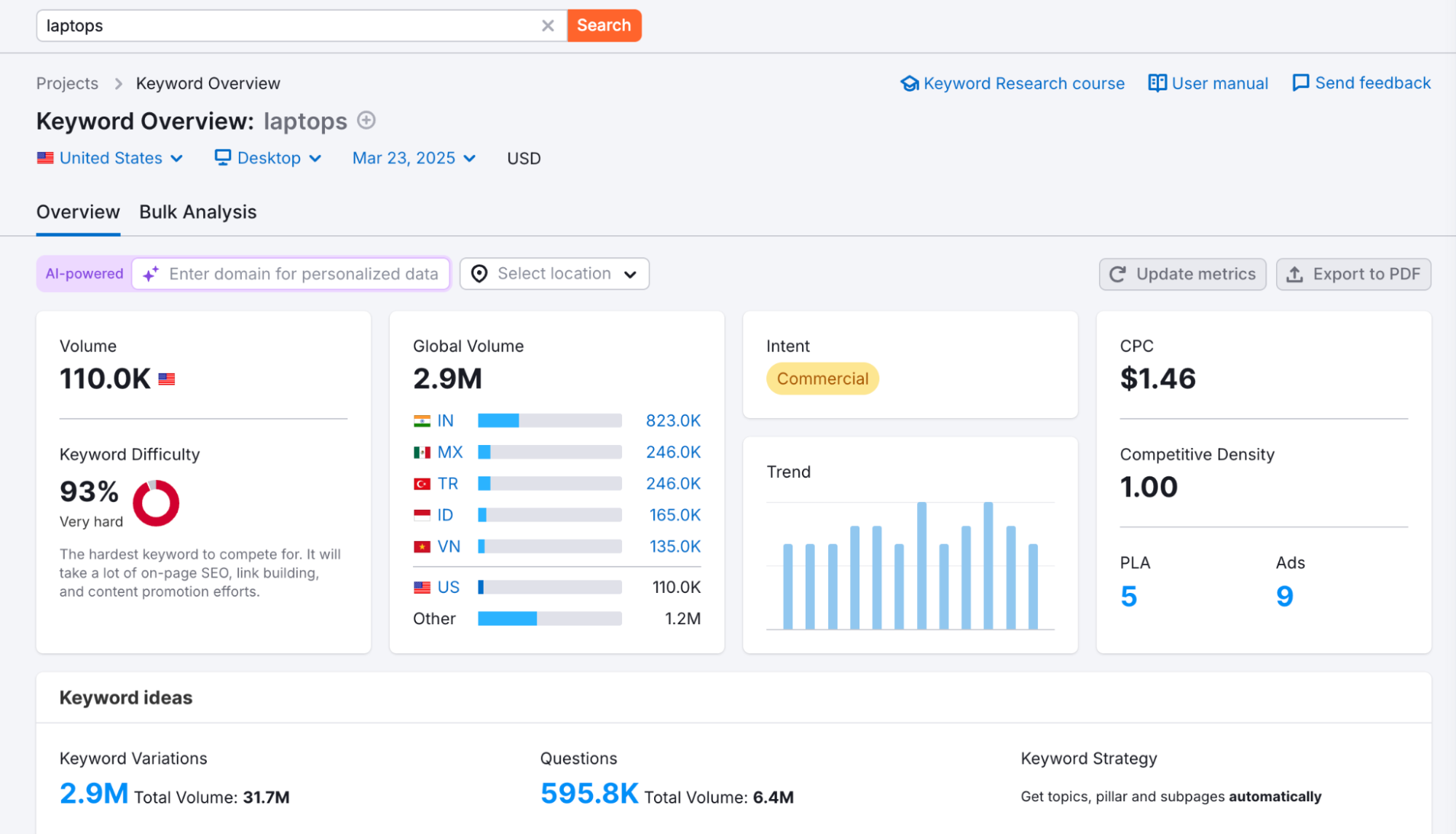
- Comprehensive keyword research tools: Offers in-depth keyword analysis, including metrics like keyword difficulty, search volume, and intent, helping you find valuable keywords.
- Search intent classification: Classifies keywords based on user intent, such as informational, navigational, commercial, or transactional, helping tailor content to meet specific audience needs.
- Keyword magic tool: Provides suggestions for long-tail keyword variations and related terms, expanding opportunities for targeted content creation.
- Keyword gap analysis: Identifies keyword opportunities by comparing your site’s keywords with those of competitors, highlighting gaps that can be leveraged for growth.
Which SEO site audit features are better?
Similarweb:
Similarweb’s site audit tool offers a comprehensive solution for identifying and fixing technical SEO issues that may be impacting your website’s performance. It analyzes over 300+ performance factors, including crawlability, page speed, internal linking, and metadata, to deliver a detailed view of your site’s health. All audits are run on Similarweb’s secure servers, ensuring that your site’s performance remains unaffected during the crawl. The tool also prioritizes issues by impact, high, medium, or low, so teams can focus on the most critical fixes first. In addition, users can compare their technical SEO performance with competitors and gain valuable insights.
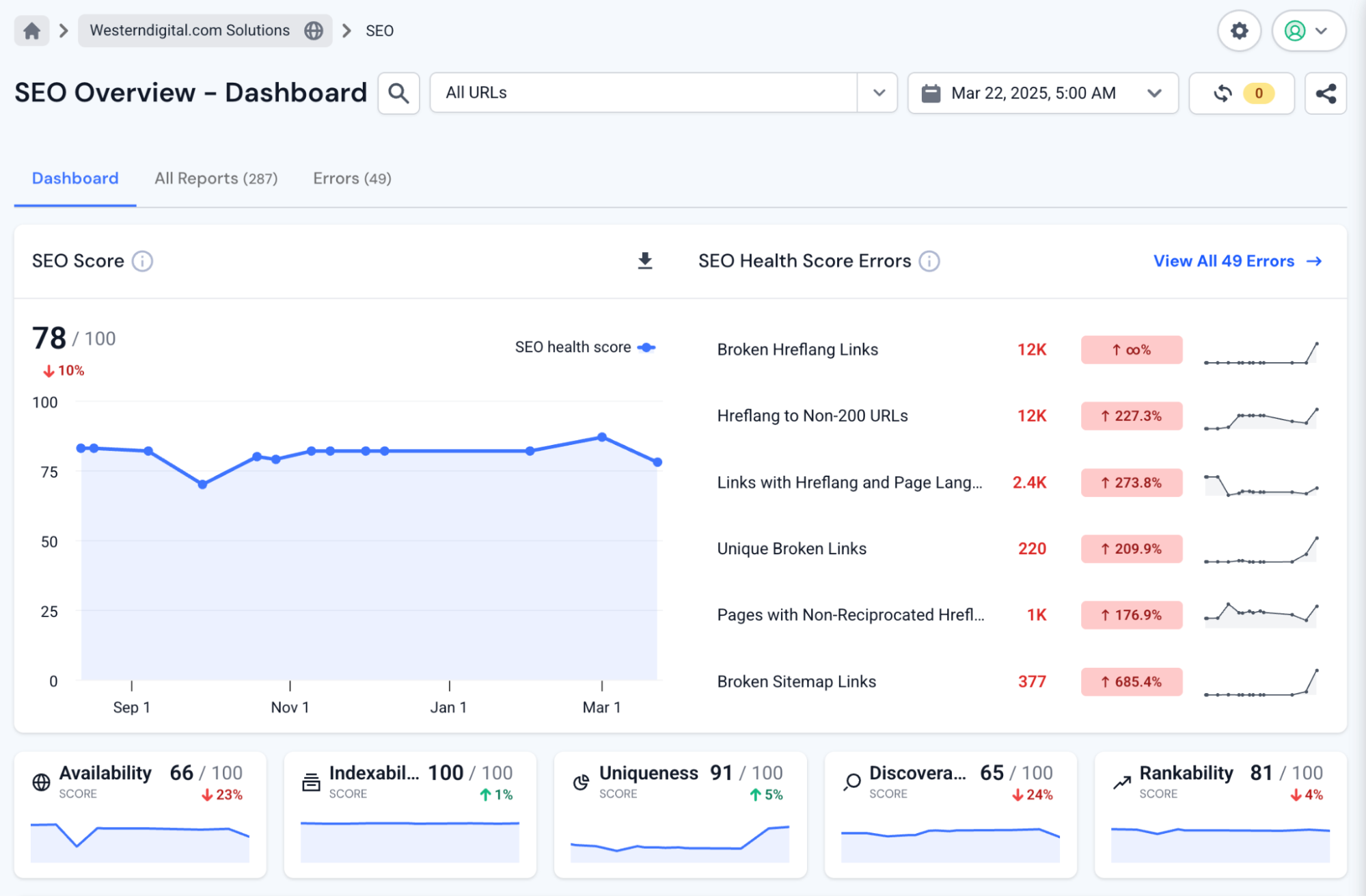
- Comprehensive performance analysis: Evaluates over 300+ performance factors to identify issues affecting your site’s SEO health and user experience.
- Server-side crawling: Conducts all crawls on Similarweb’s secure servers, ensuring that your PC and website performance remain unaffected during the audit process.
- Prioritized issue resolution: Issues are categorized by priority levels, high, medium, or low, based on their impact, enabling efficient allocation of resources to critical fixes.
- Competitor strategy analysis: Provides insights into competitors’ technical SEO performance, allowing you to benchmark and identify opportunities for improvement.
Semrush:
Semrush’s site audit tool is a powerful feature that helps users maintain a technically sound and SEO-friendly website. It performs a deep crawl of your site, checking for over 140 issues across areas like crawlability, HTTPS implementation, Core Web Vitals, structured data, and more. The tool identifies common problems such as broken links, duplicate content, redirect chains, and missing metadata, and provides clear, actionable recommendations to resolve them. Semrush also tracks page speed performance and evaluates your site against Google’s latest standards. With the ability to schedule regular audits and compare results over time, users can monitor progress and ensure their site remains optimized. Additionally, the platform allows for competitor comparison, helping you benchmark your technical SEO health against others in your niche.
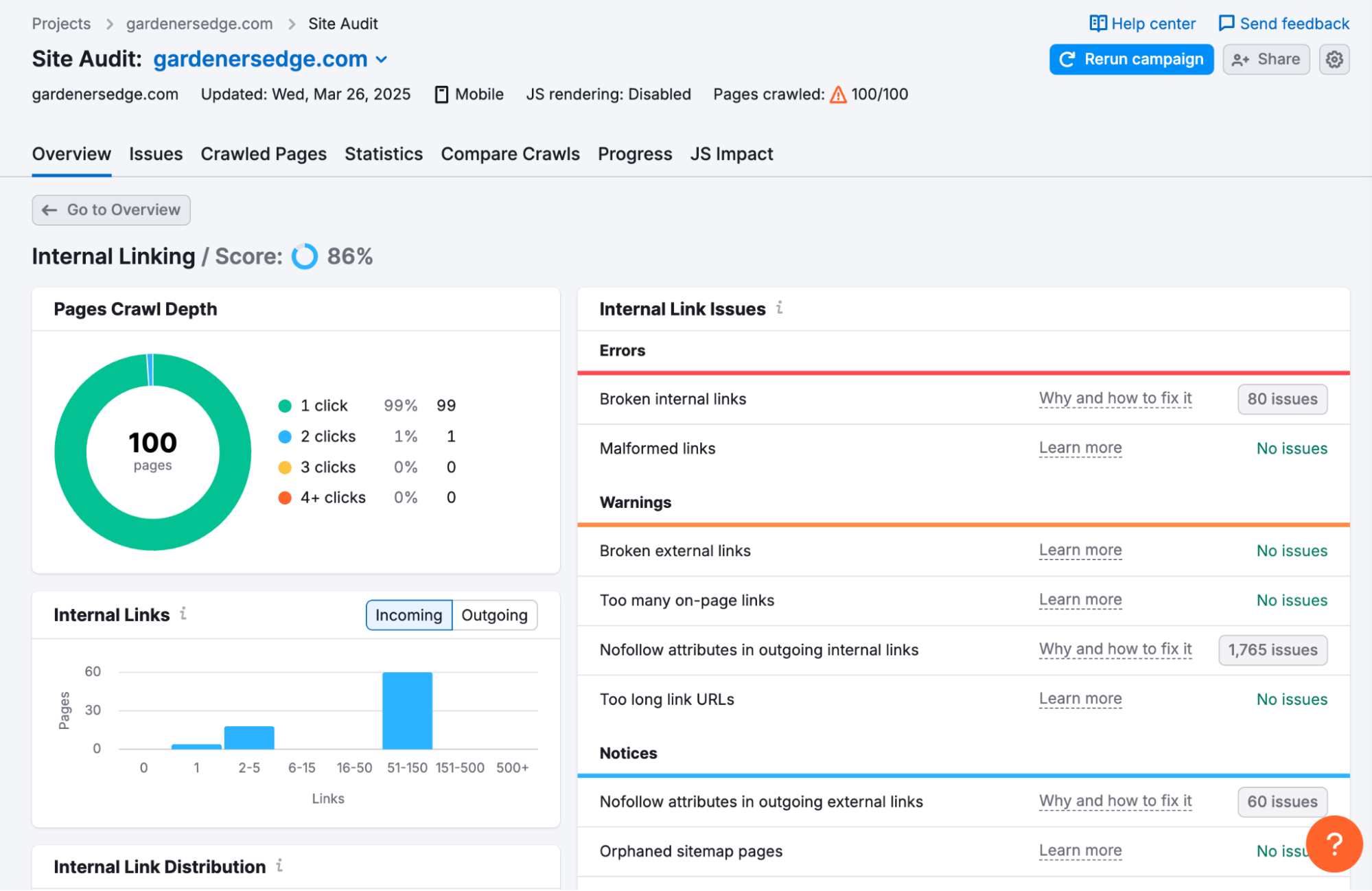
- Comprehensive technical SEO audits: Performs in-depth analyses to uncover over 140 common site issues, including crawlability problems, HTTPS implementation, and hreflang errors.
- Core Web Vitals and page speed insights: Assesses page load speeds and provides insights into Core Web Vitals, helping you enhance user experience and meet Google’s performance standards.
- Actionable fix recommendations: Offers specific suggestions to resolve issues like broken links, duplicate content, and missing metadata, facilitating targeted improvements.
- Progress tracking and reporting: Schedule regular audits and compare crawl results over time, ensuring continuous monitoring and optimization of your site’s health.
Which rank tracker is more comprehensive?
Similarweb:
Similarweb’s rank tracker provides daily keyword ranking updates, helping you monitor how your site performs in organic search over time. It includes detailed SERP feature reporting, allowing you to see whether your keywords trigger elements like featured snippets, local packs, or AI Overviews and whether competitors are gaining visibility there. The tool also tracks keyword trends, highlighting shifts in interest and helping you identify new ranking opportunities. Combined with competitive benchmarking, Similarweb’s rank tracker offers a strategic view of where you stand in the evolving search landscape.
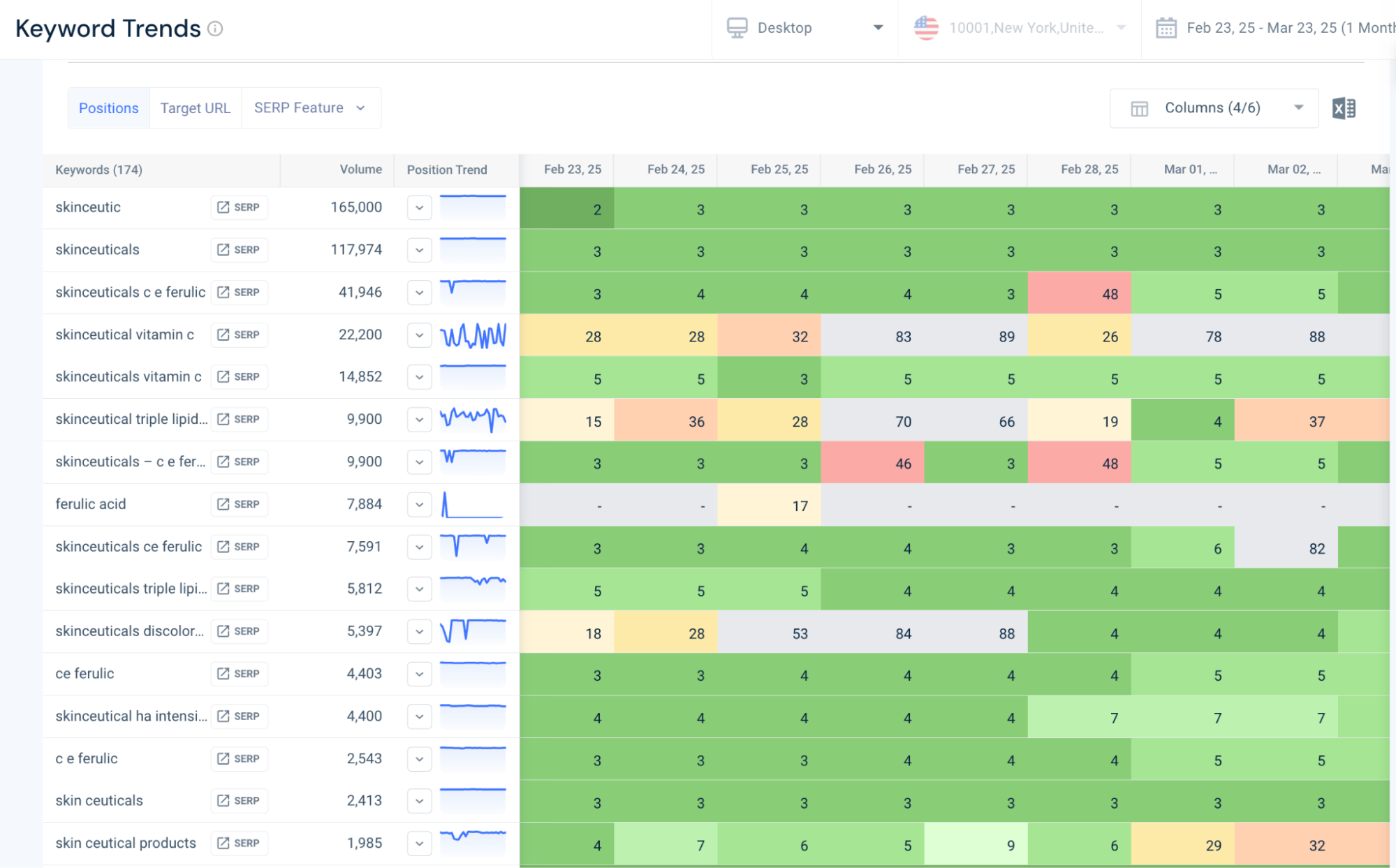
- Daily rank tracking: Monitors daily rankings for your core organic keywords, providing up-to-date insights into your search performance.
- SERP feature reporting: Identifies which SERP features (e.g., featured snippets, local packs) are present for your tracked keywords and assesses your visibility within these features. This helps you understand if competitors are capturing traffic through specific SERP elements and where opportunities lie.
- Keyword trends: Discovers emerging keywords, tracks their performance trends, and monitors your ranking positions within these trends. This allows you to capitalize on new opportunities as they arise.
- Competitor strategy analysis: Analyzes competitors’ ranking strategies across various SERP features, enabling you to benchmark your performance and identify areas for improvement.
Semrush:
Semrush’s rank tracker, known as Position Tracking, offers daily updates on your keyword rankings across desktop and mobile devices, in any location you choose. It not only tracks your positions but also monitors the presence of SERP features like Featured Snippets, Knowledge Panels, and local results, showing whether your site appears in them or not. You can also compare your rankings directly against competitors to uncover gaps and opportunities. With customizable reports and historical tracking, Semrush’s rank tracker helps you stay on top of performance trends and adjust your SEO strategy as needed.
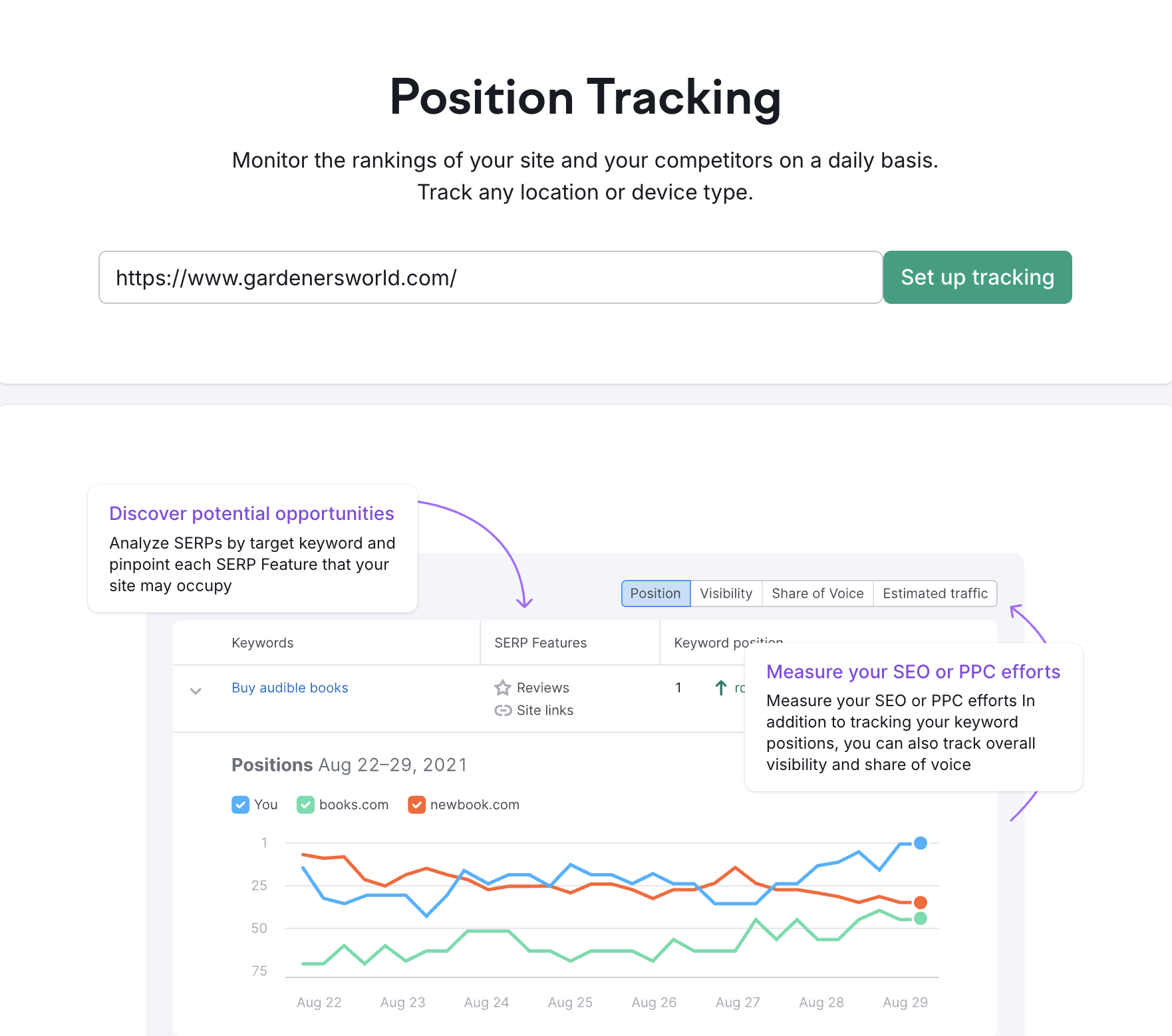
- Position tracking: Provides daily updates on keyword rankings, allowing you to monitor your search performance over time.
- SERP feature tracking: Identifies which SERP features are present for your tracked keywords and shows your site’s presence within these features, helping you understand how SERP elements impact your visibility.
- Competitor comparison: Compare your keyword rankings directly against competitors and get insights into their strategies and performance.
- Device and location tracking: Supports tracking of keyword rankings across different devices (desktop and mobile) and specific locations, providing a comprehensive view of your search visibility.
Which backlink analysis tool has more value?
Similarweb:
Similarweb’s backlink analysis tools provide a clear and comprehensive view of any website’s link profile, including both the quantity and quality of backlinks as well as link types (dofollow and nofollow). Users can track new and lost links over time, explore the domains driving the most valuable backlinks, and assess metrics like Domain Trust Score and Page Trust Score. The platform offers clean visualizations and historical data to make link trends easy to interpret. It also helps uncover relevant, authoritative domains for link-building opportunities, allowing you to strengthen your off-page SEO and benchmark your backlink profile against competitors.
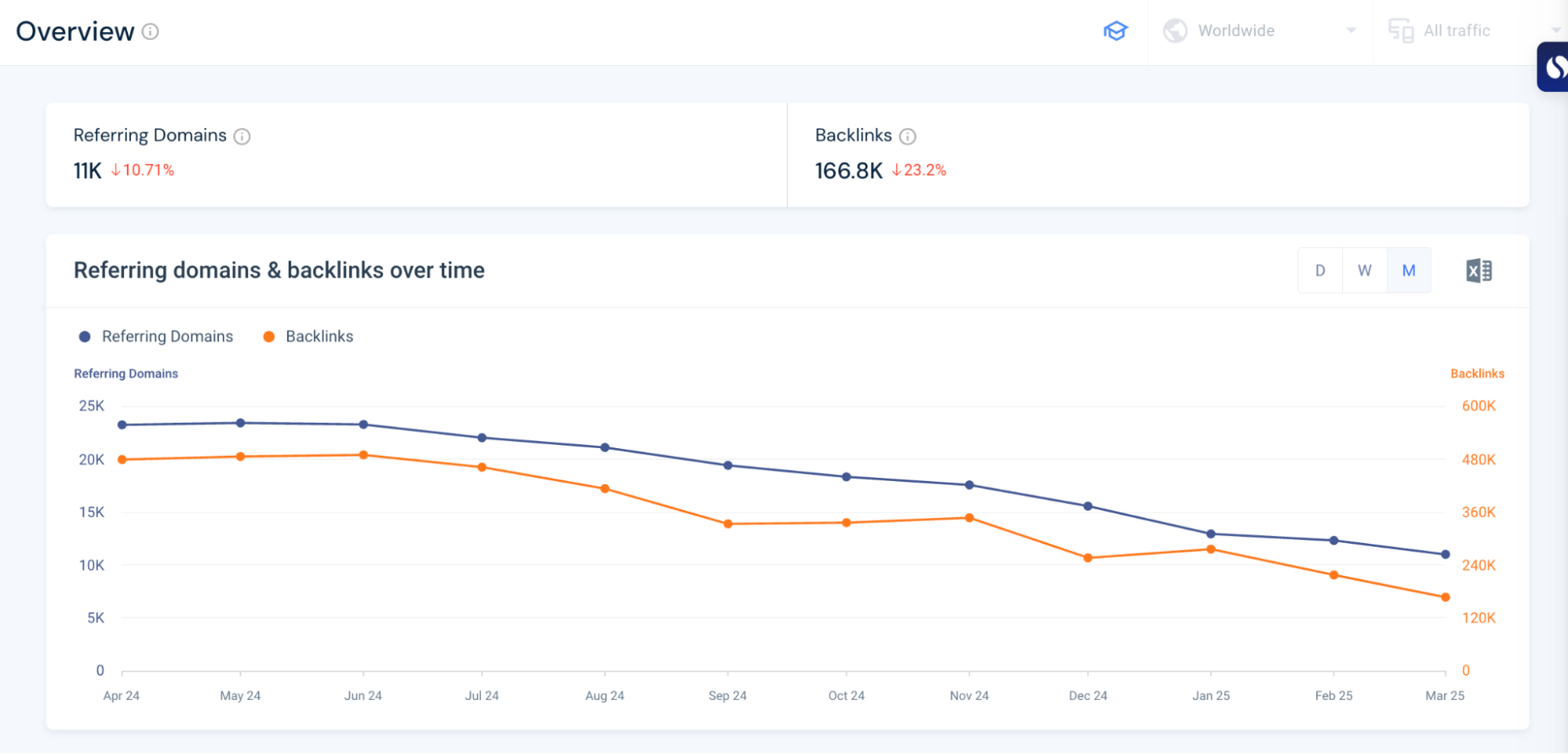
- Comprehensive backlink profiles: Provides detailed insights into any website’s backlink profile, including the quantity and quality of backlinks. Users can analyze specific dates of new and lost links, anchor text, and domain and page trust scores.
- Visualizations and historical tracking: Offers clean visual representations and historical data to monitor where backlinks are gained and lost, facilitating a clear understanding of link-building progress over time.
- Competitor backlink analysis: Take a deep dive into your competitors’ backlink profiles and identify the pages driving the best links to extract actionable insights for your own strategies.
Semrush:
Semrush’s backlink analysis tools offer a detailed breakdown of your website’s link profile, helping you evaluate referring domains, anchor texts, and link types (dofollow vs. nofollow). The tool tracks new and lost backlinks over time and assigns toxicity scores to flag potentially harmful links that could impact your rankings. With insights into competitors’ backlink strategies, you can identify high-value link opportunities and monitor progress. Semrush also includes a link-building tool that suggests outreach prospects and helps manage campaigns, making it a complete solution for growing and maintaining strong off-page SEO.
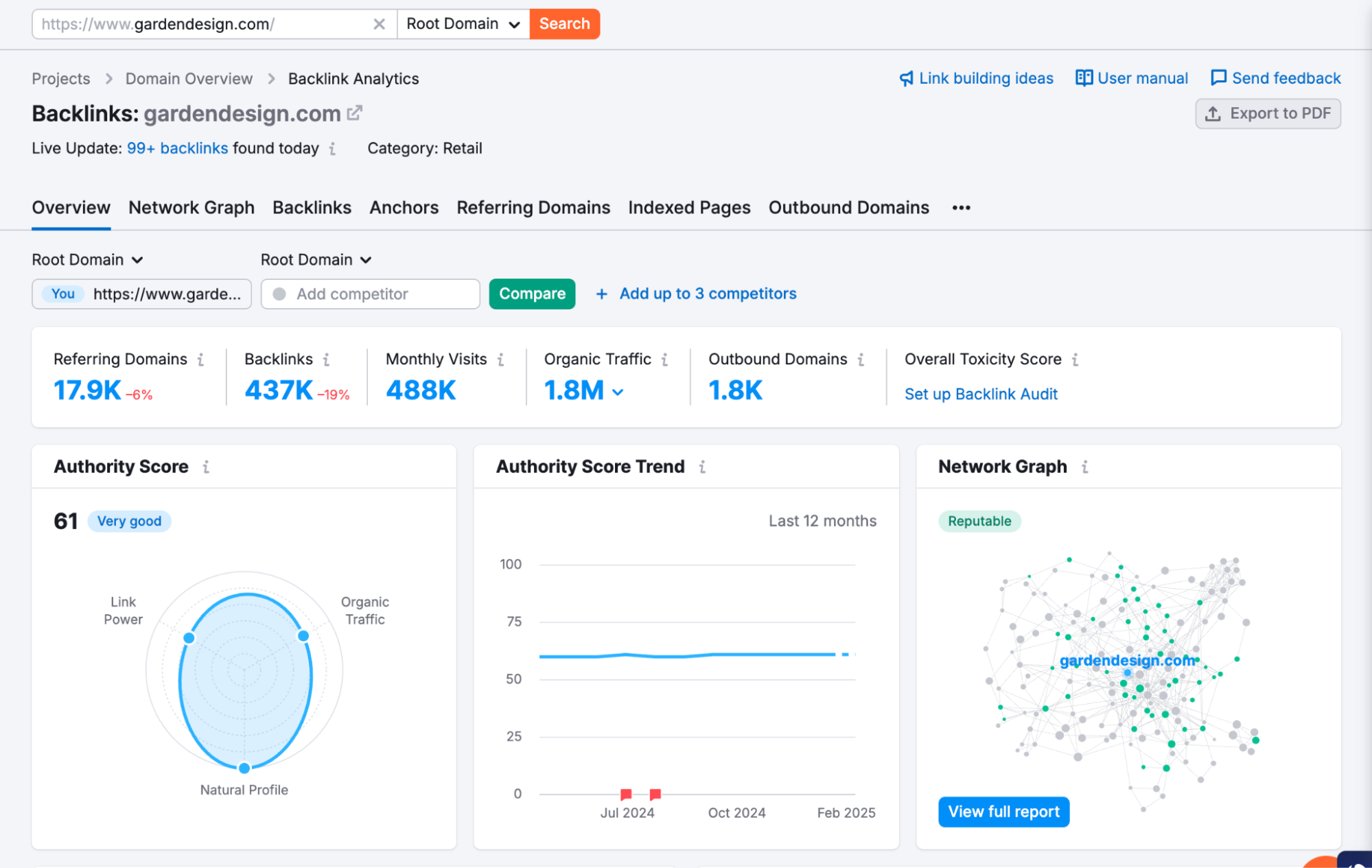
- Detailed backlink analytics: Analyze any website’s backlink profile and see metrics like authority score, referring domains, and backlink types. You can examine the total number of backlinks, referring domains, and the authority of those domains.
- Toxicity scores: Identify potentially harmful backlinks with toxicity scores, maintain a healthy backlink profile and avoid search engine penalties.
- Backlink tracking: Monitor lost and new backlinks over time and keep track of your link-building efforts and adjust strategies accordingly.
- Link-building recommendations: Get actionable insights and recommendations for acquiring high-quality backlinks and developing effective link-building strategies.
- Anchor text analysis: Analyze anchor texts used in backlinks and ensure they are targeting the right keywords and aligned to your SEO strategy.
Similarweb vs. Semrush: Which platform is best for you?
When choosing between Similarweb and Semrush, it’s essential to consider factors like data accuracy, reliability, and unique features that align with your business objectives.
1. Data accuracy and reliability: Which tool is more accurate?
Similarweb collects data from a diverse range of sources, including direct measurement, contributory networks, partnerships, and public data, to provide a comprehensive view of digital activity. This methodology ensures robust data accuracy, especially for larger websites.
Semrush is renowned for its extensive keyword database and backlink index, offering precise data beneficial for keyword research and SEO analysis.
When it comes to data accuracy, Rand Fishkin of SparkToro conducted an independent analysis comparing third-party traffic estimators and found that Similarweb is the most accurate, as it most closely matches actual Google Analytics data.
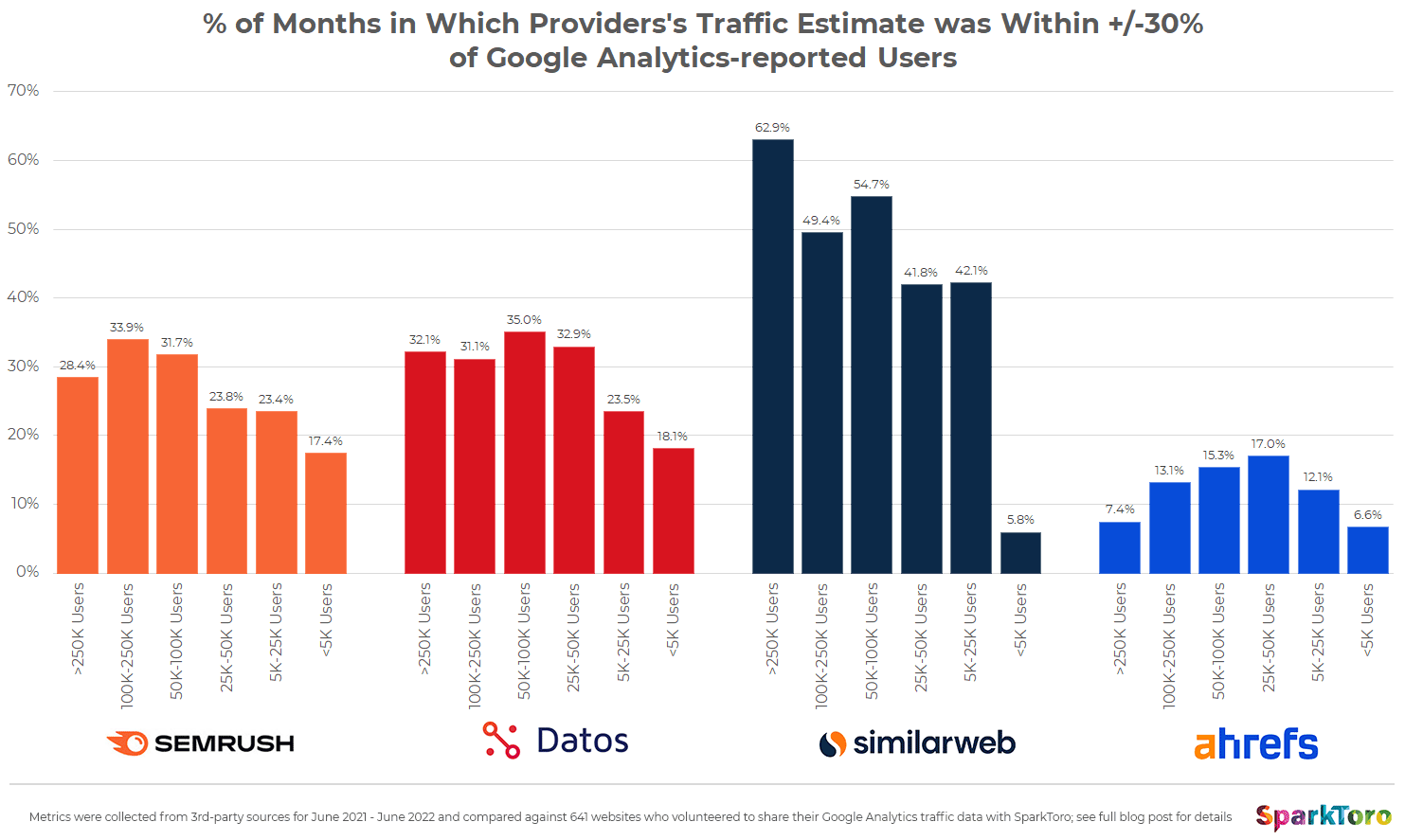
Image reference: Sparktoro.com.
2. Valuable and powerful features: Which tool offers the best features?
Both platforms offer a suite of powerful features, but Similarweb distinguishes itself with unique capabilities that enable competitor analysis and industry benchmarking, granular SERP analysis and tracking, and fresh data:
- Comprehensive traffic insights: Similarweb provides detailed traffic data, including overall traffic share, share of voice, and zero-click data, offering a clear picture of the competitive landscape for any keyword.
- Competitive benchmarking: Similarweb’s platform allows you to compare your website’s performance with competitors, identify traffic sources, and discover effective strategies within their industry.
- Granular SERP analysis: Similarweb tracks the presence of SERP features, including featured snippets, AI Overviews, and more, allowing you to see how search result pages evolve and where your brand stands in comparison to competitors. You can also see where users are clicking on any given SERP.
- Fresh data: With daily updates and visibility into the last 28 days of search behavior, Similarweb ensures you’re working with timely, actionable insights.
On balance, when it comes to features, Similarweb’s comprehensive market and competitor analysis give it an edge over Semrush.
Your choice ultimately depends on your specific business needs and which features align best with your digital marketing strategy.
FAQs
Which tool is more accurate for traffic data?
Similarweb is known for accurate traffic estimation at scale, using a combination of direct measurement, public data, and partnerships. It’s especially reliable for analyzing large websites and industries.
Can Semrush or Similarweb help with keyword strategy?
Yes. Semrush provides deep keyword research tools, including intent classification and long-tail suggestions. Similarweb adds competitive keyword insights, search intent, and SERP feature analysis across Google, Amazon, and YouTube.
Do either tool offer free versions?
Semrush has a limited free plan with daily usage caps. Similarweb offers free insights for websites, as well as free tools including a website traffic checker, app analytics, a keyword generator, and a free SERP fluctuations report.